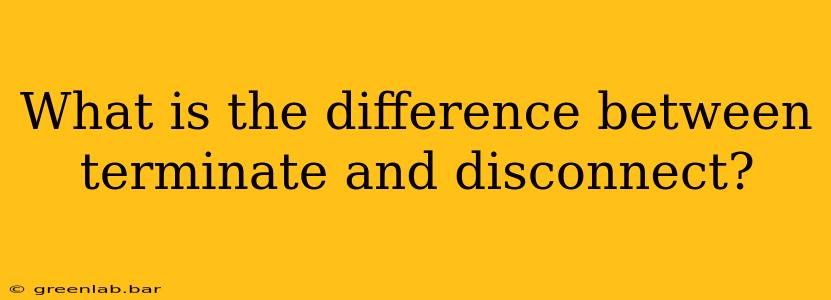The words "terminate" and "disconnect" are often used interchangeably, especially in casual conversation. However, in technical contexts and formal language, they carry distinct meanings with significant implications. Understanding these nuances is crucial for clear communication and avoiding potential misunderstandings. This article delves into the core differences between "terminate" and "disconnect," exploring their applications across various fields.
Termination: A Final and Irreversible Act
Termination implies a final and often irreversible cessation of something. It signifies the complete end of a process, relationship, or connection. There's usually no expectation of resumption or reconnection. Think of it as a definitive "end."
Examples of Termination:
- Employment: Termination of employment means the employee's job is ended, often with severance and no possibility of returning to the same role.
- Contracts: Termination of a contract signifies the official end of its legally binding agreement. This often involves specific clauses detailing the process and consequences.
- Software Processes: Terminating a software process forcefully ends its execution, usually without saving any unsaved data.
- Membership: Termination of membership from an organization means the individual is no longer a member, with their rights and privileges revoked.
Disconnection: A Temporary or Reversible Separation
In contrast, disconnection suggests a temporary or potentially reversible separation. It implies a break in connection that can be resumed later. The emphasis is on the interruption rather than the complete and final end.
Examples of Disconnection:
- Network Connectivity: Disconnecting from a network means temporarily breaking the internet or network connection. You can usually reconnect at a later time.
- Phone Calls: Disconnecting a phone call ends the conversation, but the connection can be re-established by dialing again.
- Power Supply: Disconnecting a power supply interrupts the flow of electricity, but it's generally reversible by reconnecting the power source.
- Medical Devices: Disconnecting a medical device is usually a temporary act to allow for adjustments or maintenance before reconnecting.
The Subtleties and Contextual Nuances
The key difference lies in the permanence and reversibility of the action. Termination is conclusive and permanent, while disconnection suggests a temporary interruption with the potential for re-establishment. However, the specific meaning can vary based on context.
For example, consider "terminating a pregnancy." This implies a final and irreversible end to the pregnancy. In contrast, "disconnecting from stressful relationships" could suggest creating temporary distance to improve well-being, with the possibility of reconnecting in a healthier manner later.
Conclusion: Choosing the Right Word
The appropriate choice between "terminate" and "disconnect" depends heavily on the context. Carefully consider the permanence and reversibility of the action to ensure accurate and effective communication. Using the wrong word could lead to misinterpretations with significant consequences, particularly in formal settings. By understanding the subtle yet crucial distinctions, you can communicate your message with greater precision and clarity.

